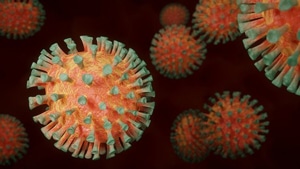January 18, 2021
Infection Control In The Age Of COVID-19
By Michael D. Shaw
According to the CDC, “Infection control prevents or stops the spread of infections in healthcare settings.” While the term is usually applied to healthcare facilities, each of us practices some sort of infection control in our daily lives, simply by our own approaches to cleanliness. And now, with the threat of catching COVID-19, infection control practices include social distancing and the wearing of masks.
Within healthcare settings, the number of healthcare-associated infections (HAIs) is significant. The usual quoted figures are that HAIs account for an estimated 1.7 million infections and 99,000 associated deaths each year. Note that these are not recent numbers, but it is difficult to obtain anything newer. Still, when one considers that most of these are preventable, it is nothing short of tragic. This column has run several articles on the matter of infection control issues, such as this one.
As to the matter of controlling the spread of COVID-19 in hospitals, the Joint Commission offered a webinar with its suggestions. Here are some highlights:
1. Delay elective procedures if necessary to limit exposures and capacity. Although, this course is not without consequences.
2. Impose restrictions on visitors.
3. Develop specific procedures on how COVID-19 patients are handled, including personal protective equipment, minimizing entry to patient rooms, and being careful around any processes that might generate aerosols (e.g. intubation, bronchoscopy, cardiopulmonary resuscitation).
4. Further minimize potential for exposures with negative pressure rooms and containment boxes.
Then, there is the matter of how a healthcare facility does its cleaning and disinfection. The CDC has promulgated comprehensive guidelines. Certainly, many of these recommendations would apply to any sort of location, but in most cases, those affected should seek the help of professionals.
Speaking of which, I was recently introduced to Seattle-based American Bio Services. This organization is a niche hazmat company specializing in disease control and microorganism remediation. Their services range from trauma and crime scene cleanup to preventative disease control.
Concetta Cippoletti, Founder and CEO of American Bio Services, is passionate about what her company does…
“The ripple effect of one COVID-19 exposure reaches the furthest shores. The impact of just one COVID-19 exposure not only closes a business, even for a short time, but also impacts the psyche and confidence of the surrounding community. The presence of some of America’s largest companies in the Seattle area magnifies this risk. As a major transportation hub for the West Coast and around the globe, an infectious disease like COVID-19 could easily cripple and compromise the Seattle/Tacoma port of entry.”
“Everything and everyone from Boeing’s newest airplane to Starbucks would suffer without an effective mitigation plan for a COVID-19 exposure. Our technical acumen coupled with our experience, professionalism, and personal attention can make a shutdown and quarantine of a facility from a COVID-19 exposure move from weeks to a matter of hours. With our services here in Seattle, we assist in the safety, health, and freedom for the country and the world.”
I would add that the effects of COVID-19 exposure are not limited to mega-corporations. Owners of small businesses have told me that a single case of COVID-19 among their employees can cause a near-panic reaction, and must be dealt with properly and professionally.
Sadly, the situation is not being helped by the uncertainty connected with the virus variants. At least, the prospect of reinfection seems rare. Some good news!

